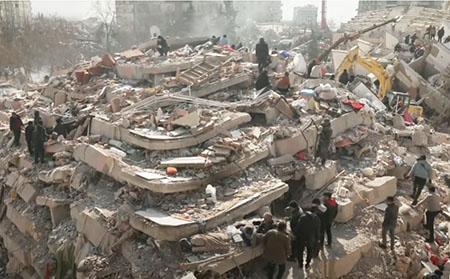by WorldTribune Staff, February 10, 2023
As the death toll from two massive earthquakes which struck Turkey and Syria climbed above 22,000, anger was boiling over at the regime of Turkish leader Recep Tayyip Erdogan for the blocking of social media and what many residents and opposition officials say has been a slow and inadequate response.
The death toll is expected to keep rising as rescuers dig into collapsed buildings. The first of Monday’s devastating quakes struck Turkey and neighboring Syria in the early hours, and registered at magnitude-7.8. It qualified as “major” on the official magnitude scale. Hours later, a second quake, registering at 7.6-magnitude, struck nearby.

Opposition leaders slammed the Erdogan government’s decision to block access to Twitter for about 12 hours, from Wednesday afternoon to early Thursday, as people scrambled to find loved ones and share information on arriving aid and the location of those still trapped in rubble.
In Turkey’s mostly-Kurdish city of Adiyaman, residents said they were furious at what they said is a slow response from the government, and said rescue teams had arrived in the city with the wrong equipment to dig through the rubble.
Meanwhile, South Korea sent a 118-member rescue team which includes doctors, emergency medical technicians and special forces trained to deal with disaster recovery in what is the largest single rescue mission ever put together by the nation.
Conservative President Yoon Suk-Yeol was one of the first world leaders who had offered to help Ankara, calling it a “brother country.” Turkey fielded ground troops to back South Korea in the 1950-53 Korean War.
In North Korea, the Kim Jong-Un regime offered condolences to the victims in Syria but said nothing about Turkey, which was a key ally to U.S.-led UN forces in the Korean War.
“Nobody was here to help us, I have complaints about all the authorities here,” said Nursen Guler on Wednesday, adding that she had one son in the hospital and another who was still trapped under the rubble. “There are no teams here, everyone is waiting for rescue teams,” she said.
Guler added that people in Adiyaman had supported Turkish leader Recep Tayyip Erdogan, who has served as either Turkey’s prime minister or its president for the past 20 years, “but now we don’t see him by our side.”
Turkish authorities said they were targeting disinformation and, on Thursday, Erdogan, who has come under scrutiny amid a cost-of-living crisis ahead of a general election in May, hit back at critics saying “dishonorable people” were spreading “lies and slander” about the government’s actions.
Attempts to control the narrative “are likely to fail,” according to Yaprak Gürsoy, a professor of European politics and chair of contemporary Turkish studies at the London School of Economics.
“To assume that there will not be any socioeconomic and political consequences of this collective trauma is naivete,” she added.
The Wall Street Journal noted:
The government’s stuttering response to the 1999 quake in Istanbul allowed Recep Tayyip Erdogan, then the city’s young mayor, to rise to the Turkish prime minister’s office, and he is now president. As he seeks to remain in power in elections this year, Mr. Erdogan must tackle the consequences of a disaster of larger magnitude that, this time, came on his watch.
Illustrating the politics around assistance to groups in Syria, Iran’s Islamic Revolutionary Guard Corps is taking a leading role in aid delivery to parts of northern Syria hit by the earthquakes and controlled by its ally, President Bashar al-Assad.
U.S. military aircrews at Incirlik Air Base in Turkey are transporting first responders to areas affected by the earthquakes. Secretary of State Antony Blinken said Wednesday the U.S. also deployed more than 150 search-and-rescue personnel to Turkey, as well as helicopters to reach areas that would otherwise be difficult to access.
The United Nations says it’s “exploring all avenues” to get supplies to rebel-held northwestern Syria, and it released $25 million from its emergency fund to help kick-start the humanitarian response in Turkey and Syria.
UN spokesman Stephane Dujarric said the road leading to the Bab al-Hawa border crossing from Turkey to northern Syria was damaged, temporarily disrupting aid delivery to the rebel-held northwest. He said the border crossing itself “is actually intact.”
Bab al-Hawa is the only crossing through which UN aid is allowed into the area.
In Turkey, Dujarric said, Syrian refugees make up more than 1.7 million of the 15 million people inhabiting the 10 provinces impacted by the earthquake.
Action . . . . Intelligence . . . . Publish
